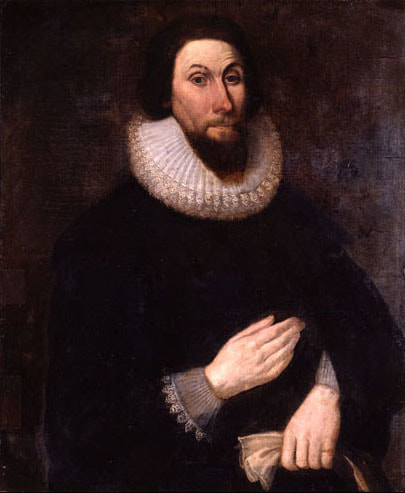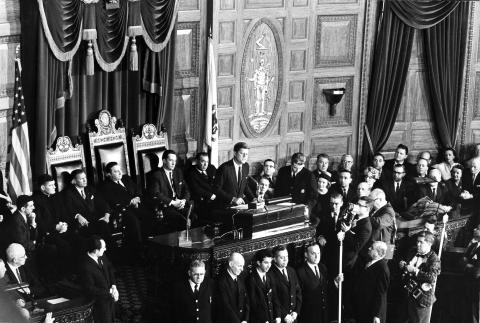It is important to note the distinction between Pilgrims and Puritans in American history. Though many Pilgrims were Puritanical, it is not universally true. The first New England Pilgrims are recognized to be a group of English people who came to America seeking religious freedom during the reign of King James I. After two unsuccessful attempts to leave England and move to Holland, a Separatist group was finally relocated to Amsterdam where they stayed for about one year. From there the group moved to the town of Leiden, Holland, where they remained for about ten years, able to worship as they wished under lenient Dutch law.
Fearing their children were losing their English heritage and religious beliefs, a small group from the Leiden churches made plans, initially, to settle in Northern Virginia. In August 1620, the group sailed for Southampton, England, where other English colonists who hoped to make a new life in America met them.
They planned to make the crossing to America in two ships, the Speedwell and Mayflower. However, after many problems the Speedwell was forced to return to England where the group was reorganized. In their second attempt to cross the Atlantic, they boarded the Mayflower in September 1620 bound for the New World. They arrived in New England, as winter was settling in and endured significant hardships as they struggled to establish a successful colony at Plymouth.
As the years passed, more Pilgrims made the journey to the New World in search of a new home and new freedoms. In time their colonies flourished and led the way to establishing religious freedom and creating the foundations of the democracy Americans enjoy today.
Fearing their children were losing their English heritage and religious beliefs, a small group from the Leiden churches made plans, initially, to settle in Northern Virginia. In August 1620, the group sailed for Southampton, England, where other English colonists who hoped to make a new life in America met them.
They planned to make the crossing to America in two ships, the Speedwell and Mayflower. However, after many problems the Speedwell was forced to return to England where the group was reorganized. In their second attempt to cross the Atlantic, they boarded the Mayflower in September 1620 bound for the New World. They arrived in New England, as winter was settling in and endured significant hardships as they struggled to establish a successful colony at Plymouth.
As the years passed, more Pilgrims made the journey to the New World in search of a new home and new freedoms. In time their colonies flourished and led the way to establishing religious freedom and creating the foundations of the democracy Americans enjoy today.
"We shall be a city upon a hill."
|
John Winthrop was one of the leading founders of the Massachusetts Bay Colony. He led the first wave of English immigrants to the Colony in 1630 and served as its Governor for more than half of colony’s first 20 years. Winthrop was not a minister but he preached a powerful sermon, A Model of Christian Charity, to his more than 1000 followers who sailed with him aboard the Arbella to the New World. His words have defined America’s early Pilgrims and have been quoted often by our nation’s presidents.
Winthrop recognized the Puritans’ quest for freedom as an endeavor no less historic than the ancient Israelites’ exodus from Egypt. He reminded his fellow Puritans: “Now if the Lord shall please to hear us, and bring us in peace to the place that we desire, then hath He ratified this covenant and sealed our commission, [and] will expect a strict performance of the articles contained in it … to do justly, to love mercy, to walk humbly with our God. … |
For we must consider that we shall be as a city upon a hill. The eyes of all people are upon us. President-elect John F. Kennedy evoked the words of John Winthrop in his pre-Inaugural speech to the Joint Convention of the General Court of the Commonwealth of Massachusetts on January 9, 1961:
|
“And so it is that I carry with me from this state to that high and lonely office to which I now succeed more than fond memories of firm friendships. The enduring qualities of Massachusetts--the common threads woven by the Pilgrim and the Puritan, the fisherman and the farmer, the Yankee and the immigrant--will not be and could not be forgotten in this nation's executive mansion. …But I have been guided by the standard John Winthrop set before his shipmates on the flagship Arbella three hundred and thirty-one years ago, as they, too, faced the task of building a new government on a perilous frontier. "We must always consider," he said, "that we shall be as a city upon a hill--the eyes of all people are upon us."
|
Descendants of the Pilgrims are shareholders in our ancestors’ sacred covenant to ensure that America remains a model of freedom and justice to the world, and, as our pilgrim ancestors envisioned, a shining "city upon a hill."
John Winthrop's City upon a Hill, 1630 -
Now the only way to avoid this shipwreck, and to provide for our posterity, is to follow the counsel of Micah, to do justly, to love mercy, to walk humbly with our God. For this end, we must be knit together, in this work, as one man. We must entertain each other in brotherly affection. We must be willing to abridge ourselves of our superfluities, for the supply of others’ necessities. We must uphold a familiar commerce together in all meekness, gentleness, patience and liberality. We must delight in each other; make others’ conditions our own; rejoice together, mourn together, labor and suffer together, always having before our eyes our commission and community in the work, as members of the same body. So shall we keep the unity of the spirit in the bond of peace. The Lord will be our God, and delight to dwell among us, as His own people, and will command a blessing upon us in all our ways, so that we shall see much more of His wisdom, power, goodness and truth, than formerly we have been acquainted with. We shall find that the God of Israel is among us, when ten of us shall be able to resist a thousand of our enemies; when He shall make us a praise and glory that men shall say of succeeding plantations, “may the Lord make it like that of New England.” For we must consider that we shall be as a city upon a hill. The eyes of all people are upon us. So that if we shall deal falsely with our God in this work we have undertaken, and so cause Him to withdraw His present help from us, we shall be made a story and a by-word through the world. We shall open the mouths of enemies to speak evil of the ways of God, and all professors for God’s sake. We shall shame the faces of many of God’s worthy servants, and cause their prayers to be turned into curses upon us till we be consumed out of the good land whither we are going.
And to shut this discourse with that exhortation of Moses, that faithful servant of the Lord, in his last farewell to Israel, Deut. 30. “Beloved, there is now set before us life and death, good and evil,” in that we are commanded this day to love the Lord our God, and to love one another, to walk in his ways and to keep his Commandments and his ordinance and his laws, and the articles of our Covenant with Him, that we may live and be multiplied, and that the Lord our God may bless us in the land whither we go to possess it. But if our hearts shall turn away, so that we will not obey, but shall be seduced, and worship other Gods, our pleasure and profits, and serve them; it is propounded unto us this day, we shall surely perish out of the good land whither we pass over this vast sea to possess it.
Therefore let us choose life,
that we and our seed may live,
by obeying His voice and cleaving to Him,
for He is our life and our prosperity.
John Winthrop, “A Model of Christian Charity,” in A Library of American Literature: Early Colonial Literature, 1607-1675, Edmund Clarence Stedman and Ellen Mackay Hutchinson, eds. (New York: 1892), 304-307.
And to shut this discourse with that exhortation of Moses, that faithful servant of the Lord, in his last farewell to Israel, Deut. 30. “Beloved, there is now set before us life and death, good and evil,” in that we are commanded this day to love the Lord our God, and to love one another, to walk in his ways and to keep his Commandments and his ordinance and his laws, and the articles of our Covenant with Him, that we may live and be multiplied, and that the Lord our God may bless us in the land whither we go to possess it. But if our hearts shall turn away, so that we will not obey, but shall be seduced, and worship other Gods, our pleasure and profits, and serve them; it is propounded unto us this day, we shall surely perish out of the good land whither we pass over this vast sea to possess it.
Therefore let us choose life,
that we and our seed may live,
by obeying His voice and cleaving to Him,
for He is our life and our prosperity.
John Winthrop, “A Model of Christian Charity,” in A Library of American Literature: Early Colonial Literature, 1607-1675, Edmund Clarence Stedman and Ellen Mackay Hutchinson, eds. (New York: 1892), 304-307.

